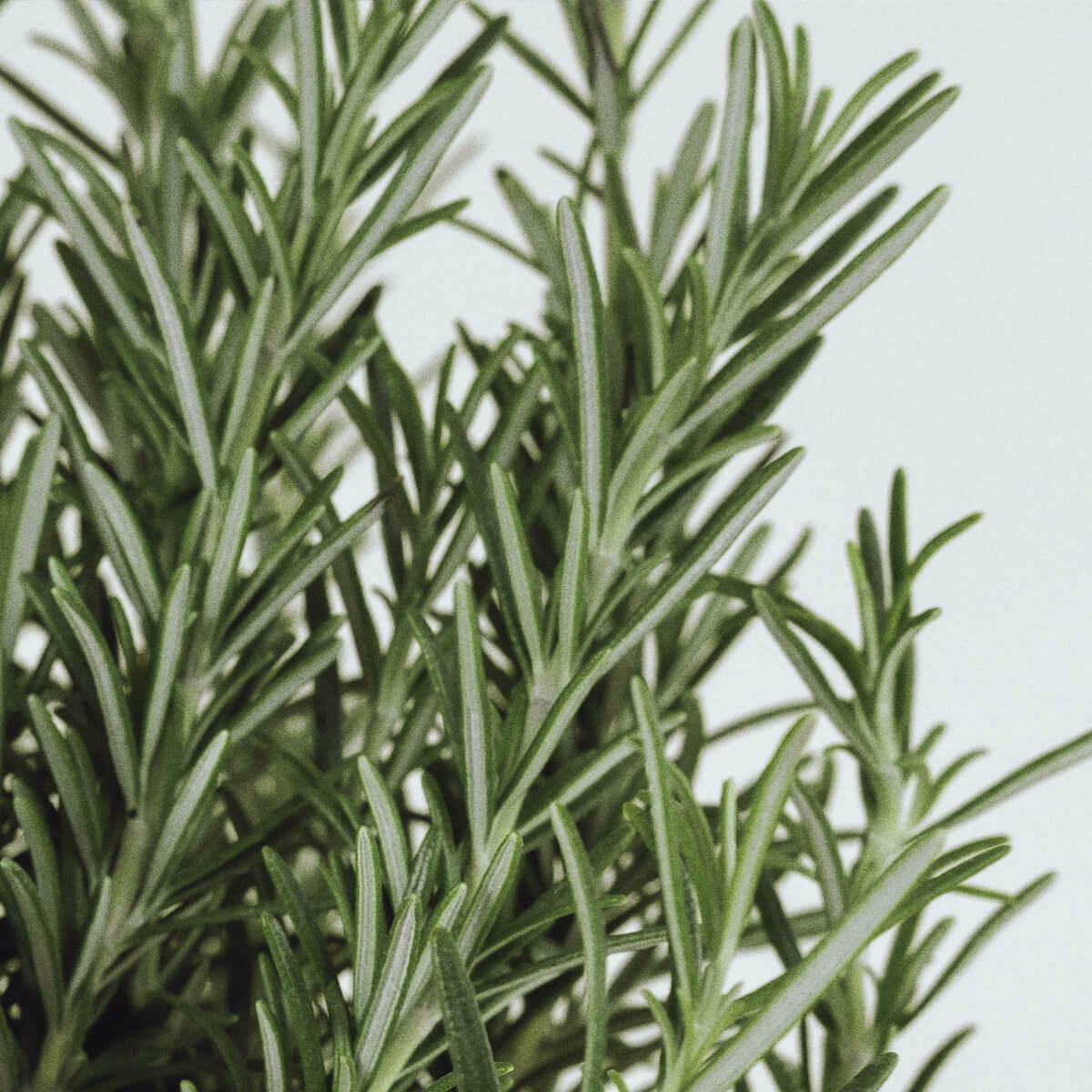Part 5 of “Inside is what's good. For you and your skin” series by This Place
Would you like to better understand the ingredients list of your cosmetics ? Check out our series of articles, “What's good is inside. For you and your skin.” by This Place. We kicked the series off with Bakuchiol – a plant that has only recently been celebrated as a hero ingredient. You can access the other articles via the links at the bottom of the page.
Are you one of those people who, when they hear the word "rosemary", immediately think of a potato dish in the kitchen?
That would not be surprising. For years, the evergreen shrub has enjoyed great popularity as a favorite in cooking shows and recipe suggestions as a guarantor of Mediterranean aroma and natural digestive aid.
But this plant offers you and your well-being much more than aromatic pep at the stove and oven!
In the following five sections, you will learn more about Rosmarinus officinalis and how rosemary can affect your body.
- Rosemary, your Mediterranean power plant.
- Rosemary in natural medicine
- Rosemary: Your skin-image improver from the kitchen shelf
- Rosemary in The Mineral Bath by This Place
- Bottom line: Rosemary, more than just a kitchen spice
Rosemary, your Mediterranean power plant
Growing about 2 meters high, this evergreen shrub is originally found in the Mediterranean regions around Spain, Portugal and southern France. In the meantime, however, the power plant also thrives in North Africa or even in some regions of Australia.
With its often bluish, sometimes white, pink or violet flowers between needle-shaped leaves that are sap green on top and whitish on the underside, it certainly graces conservatories and windowsills as an indoor plant in Germany.
Rosmarinus officinalis - as it is known in the trade - exudes a strong aroma and offers you - depending on the region of cultivation - an equally distinctive taste. This ranges from mild (France) to fresh (France) to powerful and spicy (Spain and Portugal).
Still on the branch or already plucked, rosemary regularly garnishes and flavors potato creations in German kitchens, in addition to meat and fish dishes.
As a (homemade) oil, rosemary is popular for culinary use, for example in salads and as a topping for tomato dishes.
In addition to the taste sensation, knowledge of rosemary's naturopathic aspects has been gaining ground more and more recently. For example, rosemary was Germany’s Medicinal Plant of the Year in 2011 and 2000.
This is no wonder, since rosemary is rich in nutrients as well as antioxidant and antimicrobial properties.
Rosemary in Phytotherapy
Rosemary took its place as a power plant for health in naturopathy as early as the Middle Ages [1; 2]. Despite its numerous uses for naturally enhancing health and well-being, there is still a lack of broad-based scientific studies that shed additional light on the traditional uses of rosemary in the light of the 21st century.
However, it is undisputed that health-promoting plant substances could be proven such as caffeic acid, carnosic acid, oleanolic acid, rosmarinic acid, camphor, carnosol, eucalyptol, rosmadial or rosmanol. Among other things, they fight bacteria, germs and fungi, strengthen your immune system, inhibit inflammation, support wound healing or are repeatedly discussed in their effect against cancer cells. [cf. among others 7; 8; 2]
It is precisely these findings that have contributed to rosemary's uninterrupted use for centuries as a natural remedy for physical and health ailments, including
Rosemary is considered to stimulate the appetite and can help you to gently support your digestion. [see also 11; 4]
Rosemary is said to help you relax more easily during stress peaks. The de-stressing effect is said to go so far that the intake of rosemary can even have a positive effect on anxiety [2; 3].
Studies also report a mood-lifting effect, among other things by inhaling rosemary [6].
Rosemary can be a natural support for your memory. This was the conclusion reached by American researchers in 2003 when they studied the effects of rosemary flavoring on the health status of adults.
Among other things, they found that inhaling rosemary aroma can improve short-term memory. The idea behind this is that essential oils in rosemary promote blood flow in the brain and thus support your memory at the same time. [3; 10]
Rosemary's circulation-enhancing effects have also traditionally been used to relieve headaches, muscle and joint pain, and migraines. In this context, anti-inflammatory effects - depending on the cause of the pain - can additionally promote the soothing effect.
Rosemary oil in particular is considered your all-natural helper for inflammation and wounds due to pronounced antifungal, antibacterial as well as antiseptic properties of the plant compounds in rosemary. [1; 2; 5]
Due to the analgesic effect of individual plant compounds in rosemary, the plant is often mentioned in connection with analgesic effects.
Of course, this observation can be strengthened by the simultaneous promotion of blood circulation as well as wound healing. [5]
Rosemary: Improving Your Complexion from the Kitchen Shelf
Phew, after all those uses, do you actually still think about the kitchen? Maybe a little. Because of course you can benefit from the health boost while eating.
By the way, you can also promote the health of your skin from the outside with rosemary. In addition to all the health benefits, rosemary has properties that make the plant extremely interesting for use in high-quality beauty products:
- Rosemary for your cell protection
Thus, the antioxidant plant can support your skin and its cells as a potent radical scavenger from damage caused by the environment and stress.
In addition, rosemary showed in studies the ability to positively influence unwanted tissue growth (cell proliferation) [i.a. 9].
- Rosemary for strengthening natural healing processes
In addition, rosemary can accelerate the natural healing process of your skin and help minimize aesthetic limitations as well as an unpleasant skin sensation due to inflammation as well as redness.
At the same time, antimicrobial plant compounds help to clear and purify your skin, making it easier to manage skin conditions such as acne. [1; 2; 4; 8]
- Rosemary for the refreshment of your skin appearance
In addition, the improved circulation of your skin facilitates the optimal supply of oxygen and nutrients to the cells, which can make your complexion appear more radiant.
Furthermore, thanks to rosemary, you can accelerate the reduction of swelling caused by water retention or inflammation, for example.

Rosemary Oil in The Mineral Bath by This Place
A refreshed, cleared complexion, improved circulation, anti-inflammatory and mood-lifting effects - by now you know many beauty effects of this power plant.
So it's quite clear: Rosemary has more than just one good beauty reason and is therefore rightly one of the hero ingredients in This Place's "The Mineral Bath".
Complemented by the sweat-reducing effect of sage as well as the approaching care film of cocoa butter, rosemary or rosemary oil can intensify the loosening effect of a warm bath in Epsom salt.
The next time you want to take a relaxing dip, for example in your home spa, will be a scrutinizing look at the ingredients list to discover natural supporters for your skin, its health and well-being.
Conclusion: Rosemary, more than just a kitchen spice
Rarely does a medicinal plant prove to be as universally applicable as Rosmarinus officinalis. Whether as a spice in dishes or as an ingredient in (natural) cosmetic products - the positive effects on health and well-being are many and varied.
Enthusiasm for the medicinal plant has persisted for centuries.
In studies, in addition to the anti-inflammatory, the mental effect of mood brightening and stress reduction is discussed again and again.
Rosemary can be a natural helper for your skin with pimples, wound healing and better blood circulation.

